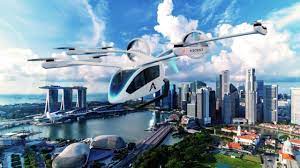The development of a flying car by Brazilian electric aircraft manufacturer Eve Holding Inc. has advanced thanks to successful wind tunnel tests, the company said on Monday.
The totally electric vehicle from Eve, which is owned by airplane producer Embraer, would reportedly begin commercial operations in 2026.
The electric vertical take-off and landing vehicle, or eVTOL, the concept has been referred to as a flying taxi.
The results of the wind tunnel testing are crucial for regulatory approval as well as upcoming production and sales to customers globally.
According to Luiz Valentini, Eve’s chief technology officer, “the information we obtained during this phase of development has helped us further refine the technical solutions of our eVTOL, before committing to production tooling and conforming prototypes.”
The business anticipates wrapping up the choice of primary equipment suppliers in the first half of this year and beginning construction on its first full-scale prototype in the second. For 2024, more testing is anticipated.
Before beginning production, Eve has a backlog of approximately 2,800 orders. Investors including United Airlines and Rolls-Royce have supported the development of the product.
The company claimed that the wind tunnel experiments, which were carried out in Switzerland using an eVTOL scale model, helped it determine how parts like its fuselage and wings will behave in flight.
Eve, which made its debut on the New York Stock Exchange last year, has indicated that certification is one of its top priorities.
Even though this isn’t the first flying car to fly, analysts believe the company is on course to achieving its ambitious goals.
According to Jefferies analysts, “The Eve eVTOL is unlikely to be first to market, although the order pipeline provides runway to capture market share of the emerging eVTOL market.”
Last week, Jefferies and JPMorgan raised their Eve target prices, citing an industry-leading backlog and support from Embraer.
This year, Eve’s stock has increased by about 10%.

















